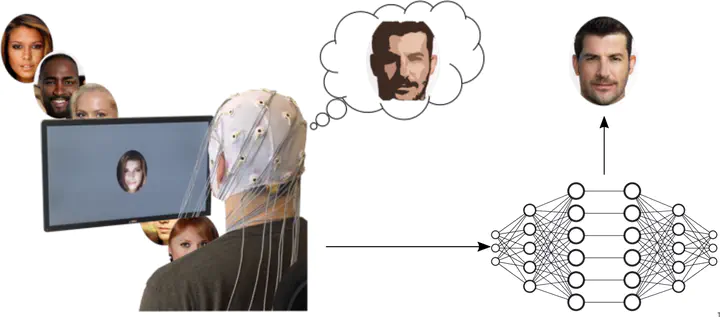
- We present the first of its kind interactive brain-computer interface for image generation combining generative adversarial neural networks and brain feedback.
- We demonstrate the technique with realistic tasks (such as generate a blond face), and complex combinations of the tasks (such as generate an old female face that is not smiling), and show that the technique can generate images matching user intentions.
- We validate the approach in an offline study. Our results show performance significantly better than random and approaching manually provided explicit feedback. Our results and generated example images show that our approach yields pragmatic performance suggesting applicability in real-world usage.
Abstract
Brain-computer interfaces (BCIs) are increasingly used to perform simple operations such as moving a cursor but have remained of limited use for more complex tasks. In our new approach to BCI, we use brain relevance feedback to control a generative adversarial network (GAN). We obtained EEG data from 31 participants who viewed face images while concentrating on particular facial features. Following, an EEG relevance classifier was trained and propagated as feedback on the latent image representation provided by the GAN. Estimates for individual vectors matching the relevant criteria were iteratively updated to optimize an image generation process towards mental targets. A double-blind evaluation showed high performance (86.26% accuracy) against random feedback (18.71%), and was not significantly lower than explicit feedback (93.30%). Furthermore, we show the feasibility of the method with simultaneous task targets demonstrating BCI operation beyond individual task constraints. Thus, brain relevance feedback can validly control a generative model, overcoming a critical limitation of current BCI approaches.
Video
Venue
- CORE ranking: A* flagship
- Scholar ranking: #10 HCI, 44 h5-index
- Acceptance rate (overall): 21%
Acknowledgments
We would like to thank Esther Ortiz for providing user assessments. The research was partially funded by the Academy of Finland. Computing resources were provided by the Finnish Grid and Cloud Infrastructure (urn:nbn:fi:research-infras-2016072533).